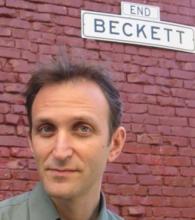Our hosts disagree as to whether fiction has a serious effect on the person reading it. Ken thinks that, to some extent, “you are what you read,” and that novels can force us to grapple with serious moral issues in a way that will improve our thinking in the non-fiction world. John, on the other hand, sees fiction as not much more than entertainment. He admits some books are better written – and therefore more captivating – but denies that even the best books could change a persons’ moral constitution. He himself is the best example of this: once a curmudgeon, always a curmudgeon.
Our guest Josh Landy joins the conversation, and places his own opinion squarely between Ken and John’s. He agrees with Ken that fiction helps the reader develop practical skills, but doesn’t think these skills must be ethical in nature. And he agrees with John, that a book will never completely transform someone; he insists, however, that it might help them see with greater clarity who they already are.
In all, Prof. Landy does not think there is one, single thing that fiction is supposed to accomplish. Rather, fiction as a genre furnishes a book with a very peculiar set of “mental exercise equipment” – unreliable narrators, breaking the fourth wall, mixtures of fantasy and reality – that one cannot find in works of non-fiction. These puzzles and paradoxes force the reader to grapple with difficult issues, and thereby improve the strength of their thinking.
Thus our guest does not think a work of fiction is valuable because it has a particular “message” we are supposed to “get”. Rather, a book, movie or play is an invitation to use our mind in ways it might not be used to – and, like a “runner’s high”, this exercise might leave us with a special feeling of accomplishment. Thus, what he looks for in books is the so-called “User’s Manual”. Included in the show are examples of such manuals in the Socratic Dialogues and the Gospel of Mark.
- Roving Philosophical Reporter (skip to 5:00) - Psychology experiments (from scientists Raymond Mar and Keith Oatley, for example) suggest that reading fiction strengthens our capacity for empathy. Fictional narratives let us “walk a mile in another’s shoes”, and thus come to understand other people as being just as deep and complex as ourselves. The neuroscience indicates, for example, that reading a fictional account of some simple action engages the same part of the brain as actually experiencing that action. Moreover, empathy tests demonstrate not only that people change from reading fiction, but that an established work of literature (in this case, a Chekhov short story) has greater effect than a more non-fictional account of the same events.



